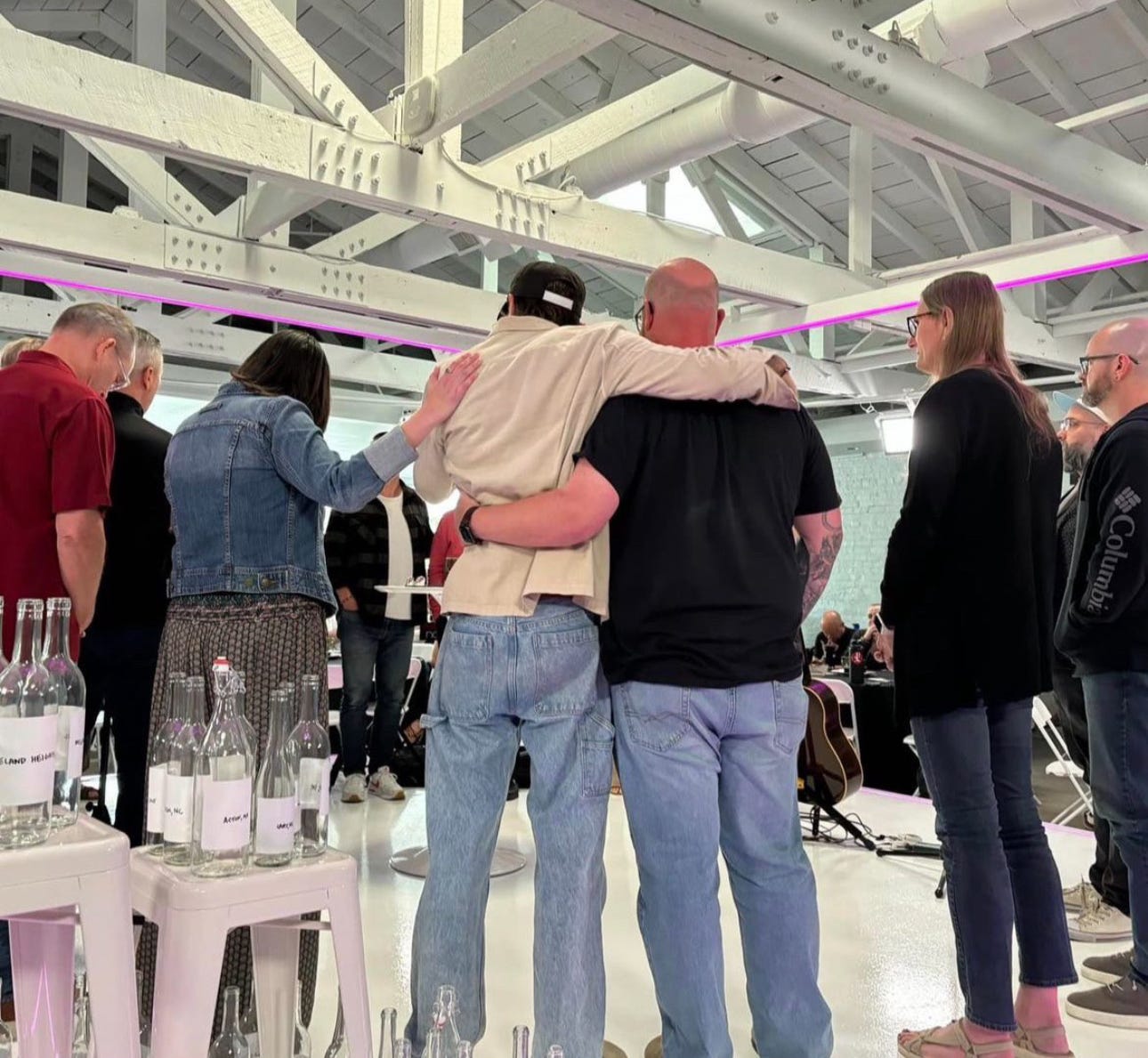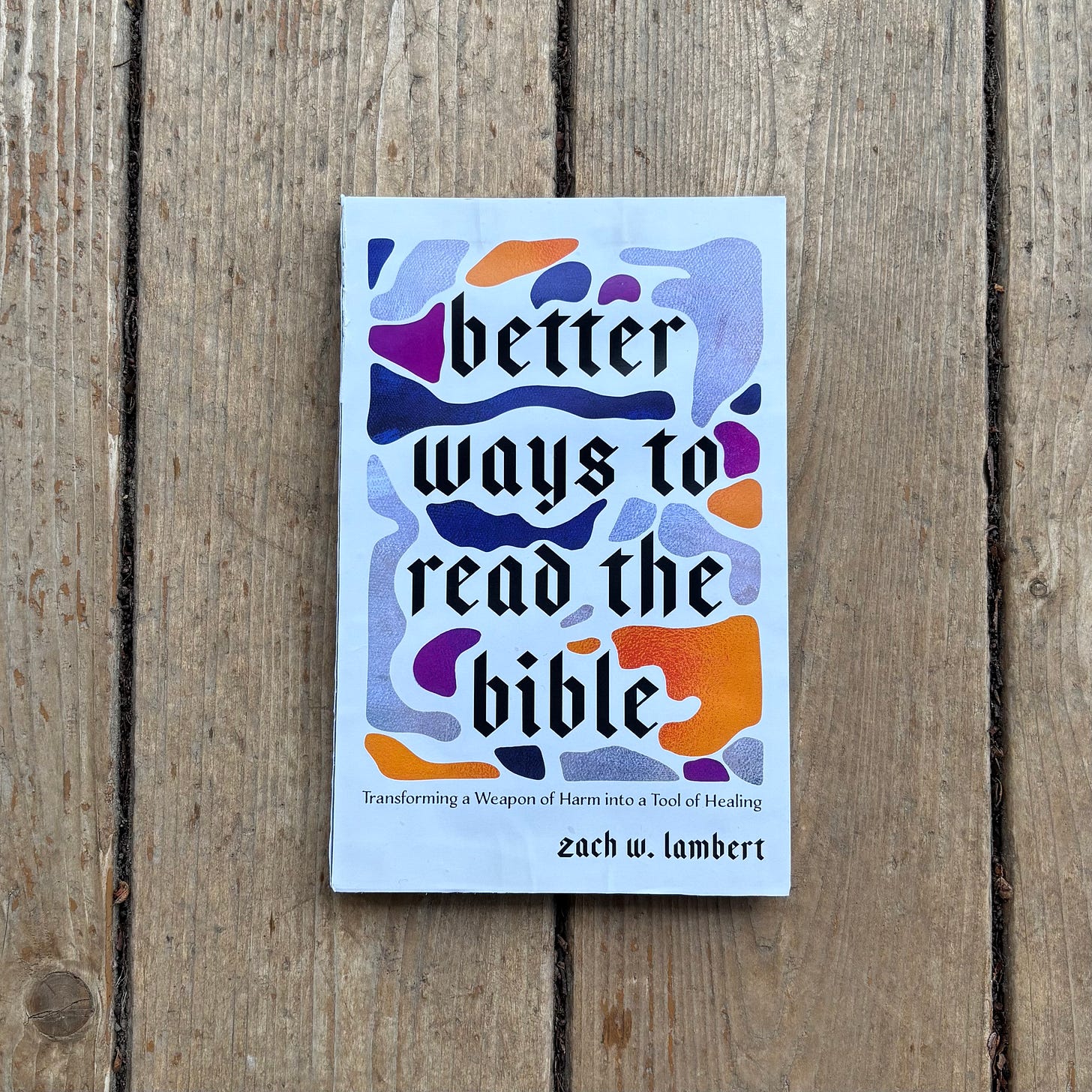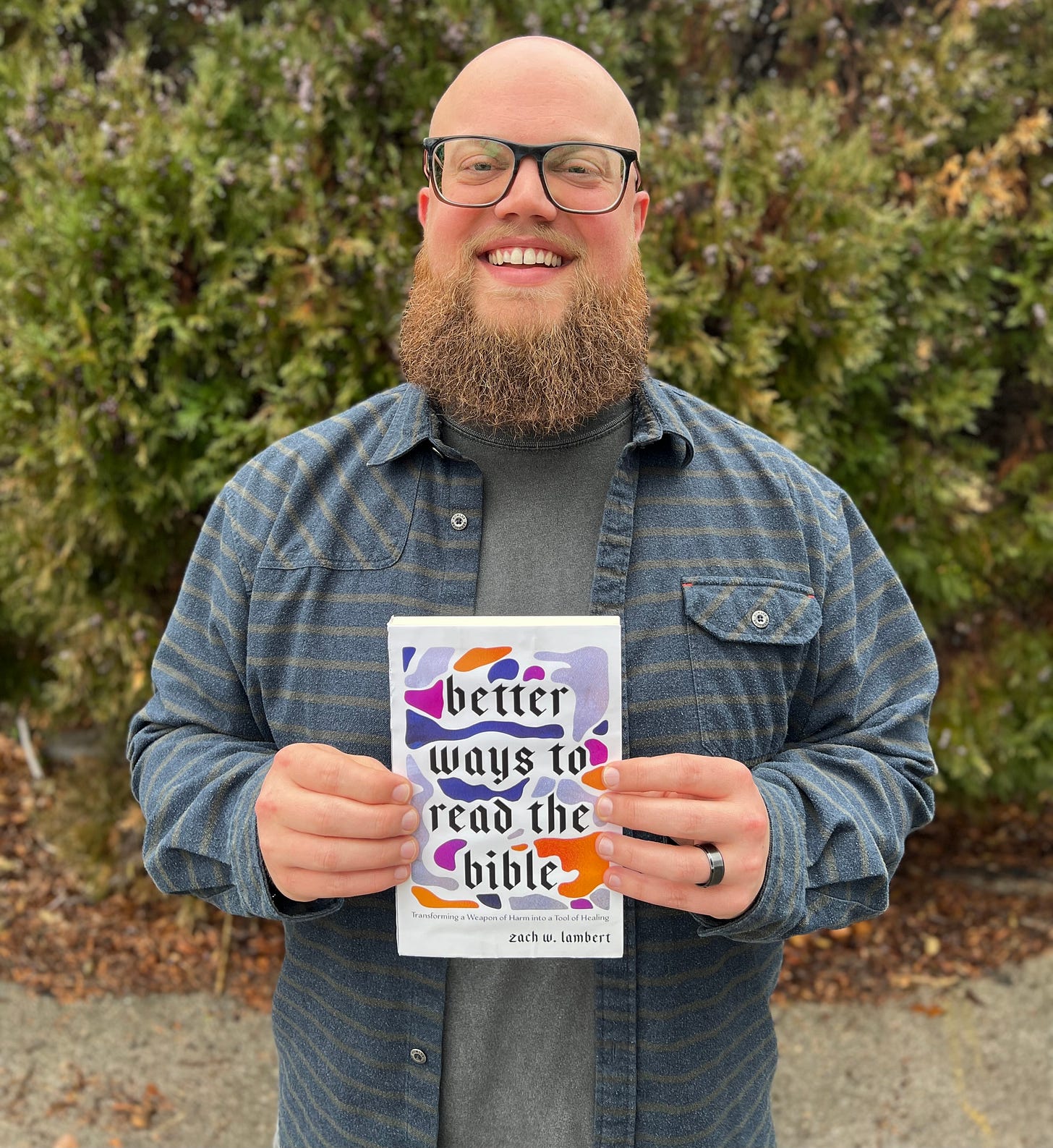Better Ways to Read the Bible with Zach Lambert
If you're mad at the Bible, you may just need to change your lenses
The first time I met Zach, we cried together.
It was at the Post Evangelical National Gathering in 2024, which concluded with a “re-frocking” ceremony. Like many pastors who have stood up in support of queer people, Zach had lost funding and denominational support. The pastors who stood in that circle had experienced ostritization, loneliness, and exile. But in that powerful moment, we were “re-frocked.” In other words, we were commissioned, and our calling as pastors was re-affirmed, regardless of what conservative denominational leaders have to say about it. It was not an official ordination, but it was deeply meaningful. Finding friends like Zach on the other side of deconstruction has been life-saving—we cannot make this journey alone.
But not only is Zach a great friend and a brave, kind pastor—he also wrote an incredibly helpful book, Better Ways to Read the Bible, which comes out Aug 12.
I’m excited to offer this short excerpt, which teases the main concept of the book. I know it’s going to help so many of you!
Here it is, your first exclusive glimpse at Better Ways to Read the Bible:
Mad at the Bible
I love the Bible, but honestly, there have been times when I kind of hated it, times when I was mad at it, and even times when I didn’t want to open it because I feared what I might find inside.
There have been seasons of my life when I curled up with my Bible and felt like I could hear God speaking directly to me through the words of Scripture. There have also been moments when I got so mad at something I read that I threw my Bible across the room.
I’m not the only one who has a complicated relationship with the Bible. I know because I’ve had countless conversations over the years in which people have expressed just how difficult it can be to engage with Scripture in ways that lead to deeper connection with God and our neighbors. I’ve also talked with numerous folks about the spiritual trauma they’ve endured, and in almost every case, the primary weapon used against them was the Bible.
These experiences have led to some people being emotionally and spiritually triggered every time they try to read it, others trudging through Bible study only to be left frustrated or confused, and still others abandoning Scripture altogether.
Such realities are nothing new, but our struggles with Scripture have escalated of late. Every year, the American Bible Society conducts a survey to study how Americans are engaging with Scripture, producing an annual report based on its findings, called State of the Bible. The latest report found that roughly twenty-six million people had mostly or completely stopped reading the Bible between 2021 and 2022. This is the sharpest decline on record.
Some of those twenty-six million people are my friends, my fellow church members, and even my pastoral colleagues.
One of these friends is Yasmeen. Over coffee, she told me about growing up in the American South with dark skin and a Middle Eastern name. “After 9/11, people said such awful things to me, but the worst things came from Christians.” One young man at her high school told her, “The book of Revelation says Jesus is going to come back and kill everyone who looks like you. After what y’all did to us, I hope it happens soon.”
Yasmeen tried to tell him that she was a Christian and that her family had been Christians for generations, but she was shouted down by his friends. Determined to be more equipped for debate the next time something like this happened, Yasmeen went to a Christian bookstore to learn more about Revelation.
“I walked through the end times theology section and found book after book that basically said exactly what that guy told me. At that point, I was done.”
Yasmeen decided she would never read the Bible again, because “any book that says God kills people because of where they’re from is garbage.” Can you blame her?
Roberto and Maria are two more of the twenty-six million. They sat in my office with tears in their eyes and told me about the day their son came out to them.
“After he told us he was gay, we didn’t know what to do.”
They went to their Christian counselor for advice.
“I’ll never forget it,” Maria said. “The counselor opened up her Bible to Leviticus 18, pulled out a marker, and started highlighting verse 22. I hate that verse so much.”
Leviticus 18:22 says, “You shall not lie with a male as with a woman. It is an abomination” (NKJV).
Roberto and Maria were told that their son stands condemned as an abomination before God.
“Unless he stops being gay,” the counselor advised, “he will spend eternity in hell.” She told them they needed to choose between God and their gay son.
Roberto and Maria chose their son.
“That was the last time either of us opened a Bible,” they told me. Can you blame them?
The God who put on flesh as Jesus Christ said he came so that absolutely everyone “may have life, and have it to the full” (John 10:10), a life defined by love, joy, peace, goodness, and all the other fruit of God’s Spirit at work.
As we all know, many people are experiencing the exact opposite at the hands of Christians.
But what if there was another way to read Scripture, one that leads to healing and wholeness in people’s lives and spirits? What if there were lenses through which we can interpret the Bible that promote love and liberation rather than exclusion and hate?
Everyone Has Lenses
Everyone who reads and interprets the Bible does so with a set of assumptions about what the Bible is and how it’s supposed to work. This set of assumptions functions like a filter or a lens through which the reader attempts to make meaning. Although everyone reads the Bible through a lens (or set of lenses)—there is no neutral or unfiltered way to read it—many people are unaware that they’re doing so and have never stopped to take stock of the assumptions they bring to the text and how those assumptions impact interpretations.
As a new pastor, I began to look at the ways I had been taught to read the Bible, including all the assumptions I’d inherited during my childhood and young adulthood. That’s when I began to see that I had learned to read the Bible through four distinct lenses that often lead to harm:
The literalism lens: “The Bible says it, I believe it, that settles it.”
The apocalypse lens: “It’s all gonna burn anyway.”
The moralism lens: “Well, that’s not biblical.”
The hierarchy lens: “Submit to authority as you submit to God.”
Next, I began to study how other Bible readers in both ancient and modern times—from Jesuits in Latin America to the Black Church in the United States to Christian mystics of the Greco-Roman world—interpreted Scripture. I noticed that their ways of reading the Bible had historically led to greater spiritual wisdom, personal freedom, and communal flourishing. Their common assumptions formed the basis of what I began to call “healthy lenses”:
The Jesus lens: “The Scriptures point to me.”
The context lens: “The one who seeks will find.”
The flourishing lens: “I have come that they may have life abundantly.”
The fruitfulness lens: “By their fruit you will recognize them.”
For more than a decade, the Restore community has learned how to move away from the harmful lenses and lean into these four healthy lenses. We’ve tested and tried them in Sunday morning sermons, small group discussions, Bible classes, and conversations between friends. And the results have been stunning: People have been set free from toxic interpretations, wounds have been healed, and our community has begun to live out a version of Christianity that actually looks like Jesus.
Pre-order your copy now! As a pre-order bonus, you can download the audiobook for free (read by Zach) when you order the physical book. Download the bonuses here.











Not me tearing up at the first sentence and picture on this post 😭. Thank you so much, Brian. Love you bro!
I don't know who needs to hear this, but the Bible isn’t a weapon unless you’re determined to swing it like a sword and then act shocked when people bleed. What Zach’s offering here is not a new gospel—it’s a return to the one we buried under pulpits and power structures.
The Jesus who sat with outcasts didn’t ask for proof texts. He just healed. He just listened. He just loved.
If you’ve ever thrown your Bible across the room, congratulations: you were probably closer to revelation than whoever handed you the highlighter and the hellfire.
This isn’t heresy. It’s healing. And if your theology doesn’t lead to flourishing, you might be worshiping your lens, not your Lord.